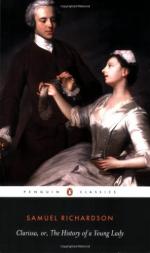How, Sir!—Sure this cannot be the case!—I can tell you, Sir, if Miss Howe thought this, she would not approve of it at all: for, little as you think Miss Howe likes you, Sir, and little as she approves of your actions by her friend, I know she is of opinion that she ought to have nobody living but you: and should continue single all her life, if she be not your’s.
Revenge and obstinacy, Mr. Hickman, will make women, the best of them, do very unaccountable things. Rather than not put out both eyes of a man they are offended with, they will give up one of their own.
I don’t know what to say to this, Sir: but sure she cannot encourage any other person’s address!—So soon too—Why, Sir, she is, as we are told, so ill, and so weak——
Not in resentment weak, I’ll assure you. I am well acquainted with all her movements—and I tell you, believe it, or not, that she refuses me in view of another lover.
Can it be?
’Tis true, by my soul!—Has she not hinted this to Miss Howe, do you think?
No, indeed, Sir. If she had I should not have troubled you at this time from Miss Howe.
Well then, you see I am right: that though she cannot be guilty of a falsehood, yet she has not told her friend the whole truth.
What shall a man say to these things!—(looking most stupidly perplexed.)
Say! Say! Mr. Hickman!—Who can account for the workings and ways of a passionate and offended woman? Endless would be the histories I could give you, within my own knowledge, of the dreadful effects of woman’s passionate resentments, and what that sex will do when disappointed.
There was Miss Dorrington, [perhaps you know her not,] who run away with her father’s groom, because he would not let her have a half-pay officer, with whom (her passions all up) she fell in love at first sight, as he accidentally passed under her window.
There was miss savage; she married her mother’s coachman, because her mother refused her a journey to Wales; in apprehension that miss intended to league herself with a remote cousin of unequal fortunes, of whom she was not a little fond when he was a visiting-guest at their house for a week.
There was the young widow Sanderson, who believing herself slighted by a younger brother of a noble family, (Sarah Stout like,) took it into her head to drown herself.
Miss Sally Anderson, [You have heard of her, no doubt?] being checked by her uncle for encouraging an address beneath her, in spite, threw herself into the arms of an ugly dog, a shoe-maker’s apprentice, running away with him in a pair of shoes he had just fitted to her feet, though she never saw the fellow before, and hated him ever after: and, at last, took laudanum to make her forget for ever her own folly.
But can there be a stronger instance in point than what the unaccountable resentments of such a lady as Miss Clarissa Harlowe afford us? Who at this instant, ill as she is, not only encourages, but, in a manner, makes court to one of the most odious dogs that ever was seen? I think Miss Howe should not be told this—and yet she ought too, in order to dissuade her from such a preposterous rashness.




